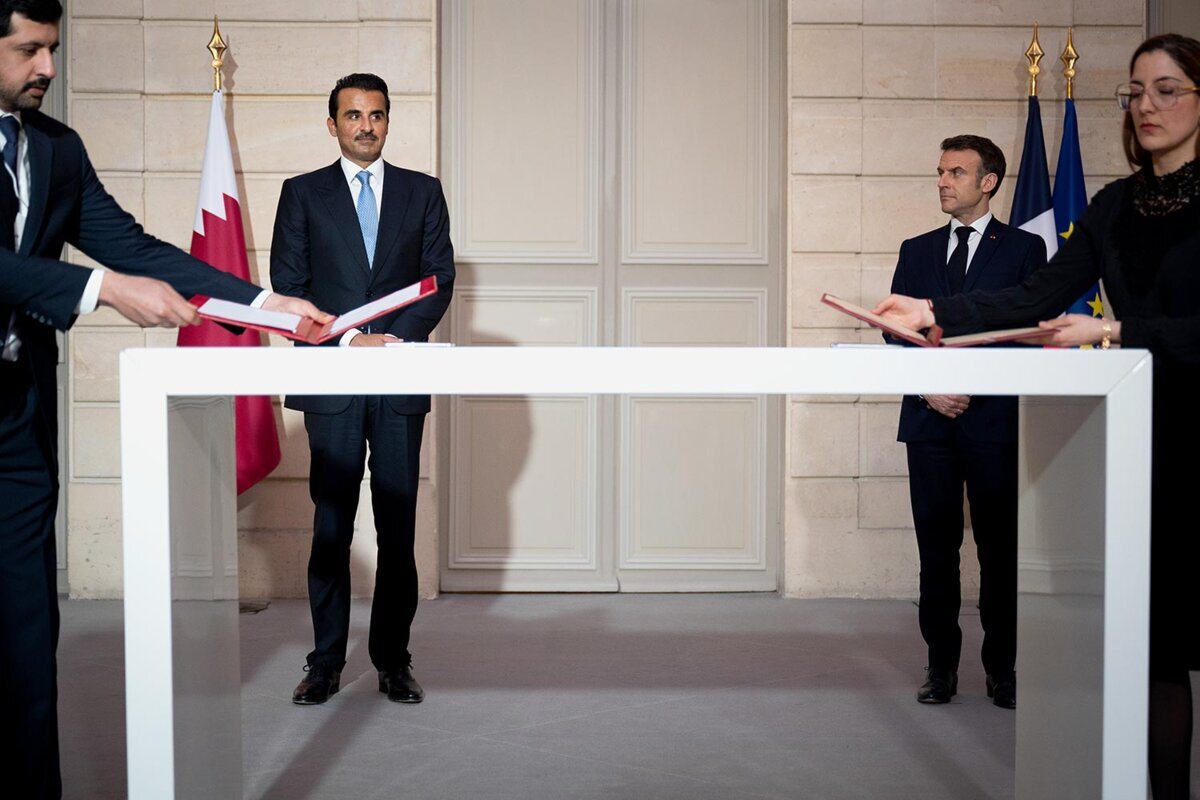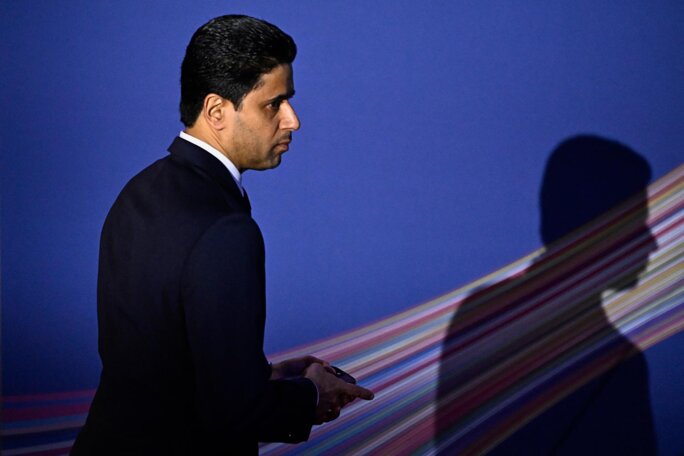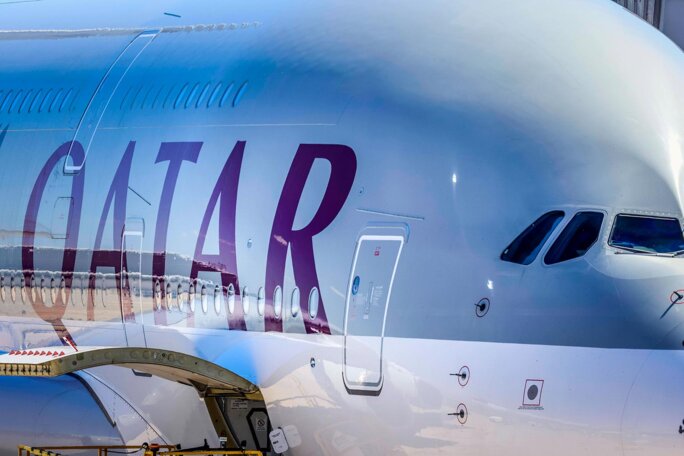The red carpet was rolled out for the Emir of Qatar in Paris this week. On Tuesday and Wednesday French president Emmanuel Macron hosted the Qatari head of state Tamim bin Hamad Al Thani for a full state visit, the highest level of protocol for a visiting head of state. It is the first time that the emir has been granted this honour in France since taking over from his father in 2013 as the head of this ultra-wealthy gas state which, among other interests in France, owns the football club Paris Saint-Germain (PSG).
The discussions between the two heads of state were dominated by the crisis in Gaza, with international negotiations having resumed in the Qatari capital of Doha in a bid to arrange a ceasefire, to free more Israeli hostages and to allow in humanitarian aid for the Palestinian people there.
The pomp of this state visit also symbolised a diplomatic recalibration by Emmanuel Macron in relation to Qatar. Senior figures in the emirate have for years complained about the closeness of the French president to its Gulf rivals Saudi Arabia and the United Arab Emirates.
The warming of relations between Paris and Doha began at the football World Cup in Qatar in 2022 and has gathered pace since the massacre of 1,200 Israelis carried out on October 7th by Hamas, the armed branch of the Palestinian movement, and the subsequent bloody military operation launched in reprisal by Israel in Gaza, where the civilian population is suffering an unprecedented humanitarian crisis.

Enlargement : Illustration 1

Criticised for its financial and political support for Hamas, Qatar managed a spectacular return to favour by positioning itself as the main mediator in the crisis, and by negotiating an initial ceasefire and the release of 103 hostages, including three Franco-Israeli citizens, in November. Emmanuel Macron thanked the emir for this help during a visit the French president made to Doha in December.
The French president needs Qatar. And he has therefore been ready to make concessions on contentious issues (human rights violations, corruption cases) and also to look after the emirate's financial interests in France. This is shown by planning documents, seen by Mediapart, drawn up in preparation for the emir's visit by the French Ministry for Foreign Affairs, and much of whose content has already been revealed on the independent news website Blast. When approached about these documents, the ministry did not respond.
Freeing the hostages
On top of the current efforts to try to obtain a ceasefire and a resumption of humanitarian aid to Gaza, the Élysée said before the emir's visit that the French president would be raising the issue of “freeing the hostages, which is clearly a priority”. Hamas is still holding three French citizens.
The emirate also intervened on behalf of nine Palestinian journalists from the French news agency Agence France-Presse (AFP) who were trapped in the Gaza strip. Phil Chetwynd, director of information at AFP, told Mediapart that Qatar, supported by France, had on February 15th obtained the evacuation and transfer to Doha of around 20 members of these journalists' families. “France didn't want to register the AFP journalists and their families on its list of persons to evacuate and preferred to let them feature on Qatar's list,” said one AFP source.
According to one document from the Ministry of Foreign Affairs, the French government had hoped that the AFP journalists would be safely removed from Gaza before the emir's visit to Paris. But the Qatari negotiators got a flat refusal from Israel, who accuse some photo-journalists of having covered the start of the Hamas attack, meaning they would have been informed about it ahead of the operation. Three of the nine AFP journalists have meanwhile managed to leave Gaza under their own steam.
In a planning note ahead of the emir's visit, the Ministry of Foreign Affairs in Paris acknowledges it has been working closely with Qatar despite the latter's links to Hamas and the editorial line taken by the Qatari news channel Al Jazeera which is “very critical of France”. This document states how the establishment of Hamas's political office in Doha was “decided in association with the Israelis and the Americans” and that Qatar's financial support for the Hamas authorities in Gaza was carried out “at the demand of and under the supervision of the Israelis”. Other possible direct payments to Hamas, outside of this funding, had “not been confirmed by our services up to now”, the ministry report adds.
It was the resolution of another less prominent issue of disagreement which also helped to smooth relations between the countries. This is the Qatari funding of religious establishments in France and in particular those associated with people close to the Muslim Brotherhood. In December 2021, during a visit to Doha, France's national intelligence coordinator Laurent Nuñez - he is now Paris police chief - had asked Qatar to stop funding around fifteen French schools, mosques and Muslim associations that were deemed too radical.
At the time the Qatari authorities said they had never received this list and attacked what they called a “pure invention by Mr Nuñez”. But the planning note from the ministry in Paris states that the initiative did indeed take place and also that it bore fruit. “In 2021 Qatar confirmed its commitment to refrain from all funding of the Muslim religion in France,” says the note, which adds that since then “no new flow [of money] has been detected”.
PSG boss indulged by Élysée despite legal cases
No controversial issue could be allowed to disrupt this week's visit. In a note dated February 20th, and revealed by Blast, France's Ministry of Foreign Affairs lists thirteen issues described as “irritants”. Alongside each one are the accusations made against Qatar and then the ministry's official line to take with journalists about these issues.
The contrast between the two – the complaints and the line to take – is striking, and shows that the French government had no intention of putting pressure on the emirate over the issue of human rights during this week's visit.

Enlargement : Illustration 2

The French ministry is very critical in some of its assessments, pointing out that the emirate “broke” its de facto moratorium on capital punishment by executing a convicted prisoner in 2020, that homosexuality is still “illegal” and punishable by a seven-year jail term, and that despite progress Qatari civil law is still unfavourable to women.
In the event of questions on these subjects, the proposed responses were limited to reminding the questioner about France's stance, and to politely invite the emirate to make progress. On the issue of “the rights of LGBT+ people”, for example, the proposed response is that “everywhere in the world, including Qatar, France is committed to the universal decriminalisation of homosexuality”.
The most explosive issue concerns the many criminal cases involving Qatar, in Brussels and above all in France. Here the legal system is investigating suspicions of corruption concerning the awarding of the football World Cup to Qatar, the suspected corruption of a Member of Parliament and a journalist from BFMTV news channel, spying claims involving PSG, possible tax breaks given to the football club by government minister Gérald Darmanin and the investigation into illegal employment targeting PSG president Nasser al-Khelaifi.
“The legal and media accusations targeting senior Qatari figures (in particular Nasser al-Khelaifi, the president of PSG who is close to the emir and has the rank of minister) … irritate the emir and his inner circle in as far as they dent the emirate's image,” says the planning note written last week at the ministry in Paris. It adds: “Nasser al-Khelaifi could be part of the official delegation during the state visit.”
In July last year the Qatari prime minister wrote a furious letter to France's foreign minister complaining about the extraordinary body search to which Nasser al-Khelaifi was subjected at Le Bourget airport near Paris as he stepped off his private jet. The Qatari authorities had put pressure on the French police and tried, in vain, to plead that the PSG boss had diplomatic immunity.
He was at least spared such misfortune during the two days of the state visit: according to a note from the Ministry of Foreign Affairs in Paris , the Élysée had agreed to grant Nasser al-Khelaifi diplomatic immunity for the duration of the trip as long as he was part of the official delegation as a minister.
While that move is problematic in terms of principle, it will have no practical impact on judicial investigations, as detectives have already searched Nasser al-Khelaifi's home and PSG headquarters in early February, as revealed by Le Monde.
Contacted by Mediapart, the Qatari government officially denied having made any such demand. The Élysée and the Ministry of Foreign Affairs did not respond to requests for comment. In any case , as Le Parisien revealed, the Élysée decided to honour Nasser al-Khelaifi: he accompanied Tamim bin Hamad Al Thani during certain parts of the visit and was invited to dine at the Élysée along with the PSG star player Kylian Mbappé. Nothing was allowed to spoil the party: in the ministry briefing documents instructions were given to make no comment on the “judicial processes underway”.
Among other “irritating” subjects listed by the ministry was the case of Franco-Algerian businessman and lobbyist Tayeb Benabderrahmane who is at the centre of several legal processes linked to Qatar and Nasser al-Khelaifi, and who was sentenced to death by the emirate last May.
A clearly embarrassed ministry has refused to criticise this sentence against a French citizens or even confirm it, even though Qatar has informed France of it. If the issue was raised during the two-day state visit then the plan was to reply that “France is opposed to the death penalty in all places and under all circumstances”, without making any specific reference to Qatar.
Élysée looks out for Qatar's interest in France
In the name of closer relations with Doha, France's president also seems very obliging when it comes to the ultra-wealthy emirate's financial interests here in France. As a candidate during his 2017 presidential campaign Emmanuel Macron had promised to “put an end to the agreements that favour Qatar in France”, and in particular the very favourable tax convention signed in 2008 by President Nicolas Sarkozy. He has clearly changed his mind since: the exceptions granted to the Qataris (especially on capital gains tax on property) are still in place, and their cost to the French exchequer is estimated at between 150 million and 200 million euros a year.

Enlargement : Illustration 3

One planning note for the emir's visit reveals that this tax exemption is under threat from the French Treasury, who want to renegotiate these conventions with Qatar and other Gulf states as they consider such agreements to be “too unfavourable to France and/or conducive to fraud”. The documents says the Ministry of the Economy does not want anything “radically changed”, simply an “adjustment” of the most problematic areas, in particular concerning the taxation of dividends paid to Qatari investors by French companies.
Yet in its proposed responses to be used when talking to journalists, the Ministry of Foreign Affairs merely underlines that it would be dangerous for France's own interests to unilaterally criticise the conventions, and makes no mention of the fact that the French Treasure wants to renegotiate them. The Élysée did not respond when questioned about this.
The planning document reveals that Emmanuel Macron also came to the emirate's rescue on another issue. The French Parliament had been due to give its views on the liberalisation of aviation links between Qatar and the European Union. But on January 16th the Élysée decided at the last minute to “withdraw this text from the Senate agenda”. According to the ministry's note, the government was afraid that the senators might vote against the measure because of the controversies surrounding Qatar, such as the “corruption cases inside the European institutions, [its] role in the Middle East, human rights...”
When this aviation text was finalised by the European Commission in 2021 the unions at French airline Air France criticised a measure it called “completely unbalanced, inept, inconsistent and destructive [of jobs in France]”. Qatar Airways was getting privileged access to 450 million Europeans while the market offered in return is tiny – just three million inhabitants.
The legislation was adopted provisionally while the member states and the European Parliament gave their views. But in December 2022 the Qatargate corruption scandal broke in Brussels and the European Parliament decided to halt examination of all legislation relating to the emirate.
Three months later the director general of the European Commission's transport department was forced to quit after Politico revealed that he had accepted at least six free business class flights on Qatar Airways during the negotiations over the liberalisation of the airways.
However, France decided to get the legislation approved straight away by its Parliament, starting with the upper chamber the Senate. “The [Ministry of Foreign Affairs] pushed us a little to say yes, saying that the tradition is that the member states give their view before Europe,” the centrist senator Alain Cazabonne, who was the rapporteur for this bill, told Mediapart. But having carried out consultations he was worried about the law's negative consequences for Air France and about the reality of the commitments made by the emirate when it came to social rights and fair competition.
In the end, the government decided to pull the bill before it was examined by the Senate's foreign affairs committee. “I had intended to propose that Parliament wait for clarification and Europe's final decision before pronouncing on it, as German and Holland had already decided,” said Alain Cazabonne. “I can't state that the committee would have voted against the text, but that's my personal view following the conversations I had.”
According to a planning note from the Ministry of Foreign Affairs, the Élysée now wants to tackle this issue in another way: in order not to “specifically stigmatise Qatar” the plan is to merge legislation relating to EU aviation agreements with Qatar, Armenia and Ukraine into one bill, rather than get them voted on separately.
In its documents the ministry sounds modestly optimistic that the president's and France's efforts over the state visit would be rewarded in terms of investment. The biggest contract at stake was one for armoured vehicles worth several hundreds of millions of euros, for which the French group Nexter with its armoured infantry carrier (VBCI) is competing with German and Turkish competitors. The ministry notes in a planning document that while it was expected that Emmanuel Macron would bring up this case during the visit, the Élysée had indicated that they “didn't expect to sign final contacts when it comes to [military] equipment”.
Of the deals that “might be signed”, most were to do with promised investments by Qatar in conjunction with the public investment bank BPI France (some 300 million euros to one billion euros) and in private equity funds. In the event, the Élysée announced that Qatar has pledged ten billion euros of investment in the French economy in the coming years, in sectors such as “energy transition, semiconductor, aerospace, artificial intelligence, digital, health, hospitality and culture”.
France was also hoping for the signing of a new gas supply deal between the French giant TotalEnergies, which has a strong presence in Qatar, and its local partner QatarEnergy.
Since the war in Ukraine the emirate, which is one of the biggest exporters of liquefied natural gas in the world, has become even more vital for Western countries. This is despite the fact that Qatar is, according to the ministry's list of “irritant” subjects, the “country with the highest level of emissions per inhabitant in the world”. Journalists who wanted to tackle the government on this issue during the visit were to be told that France “encourages Qatar to continue with its commitment” to reduce its emissions by a quarter by 2030.
--------------------------------------------------------------------------
- The original French version of this article can be found here.
English version and additional reporting by Michael Streeter


